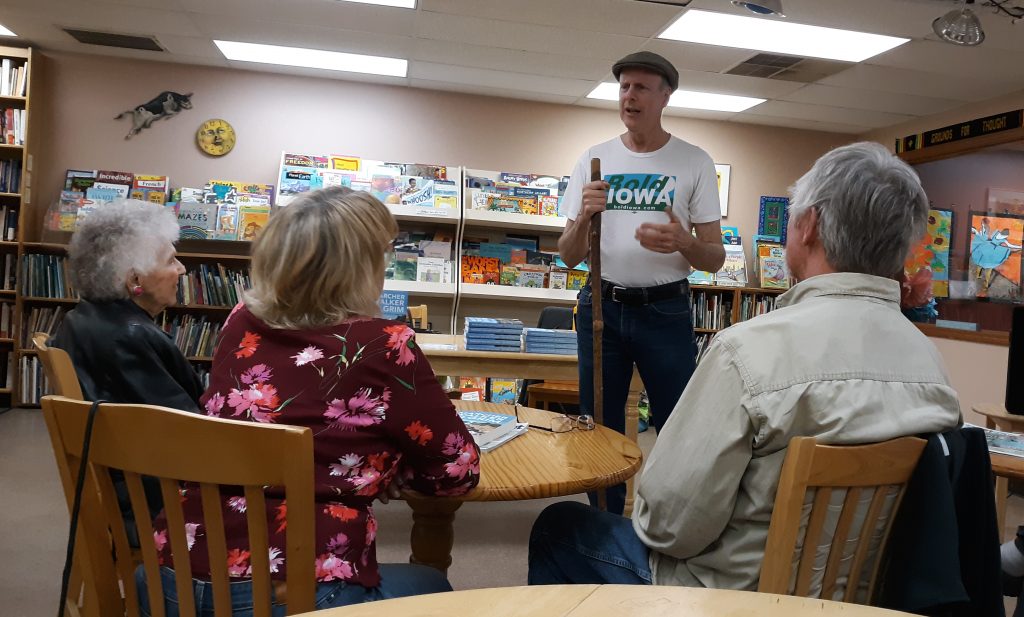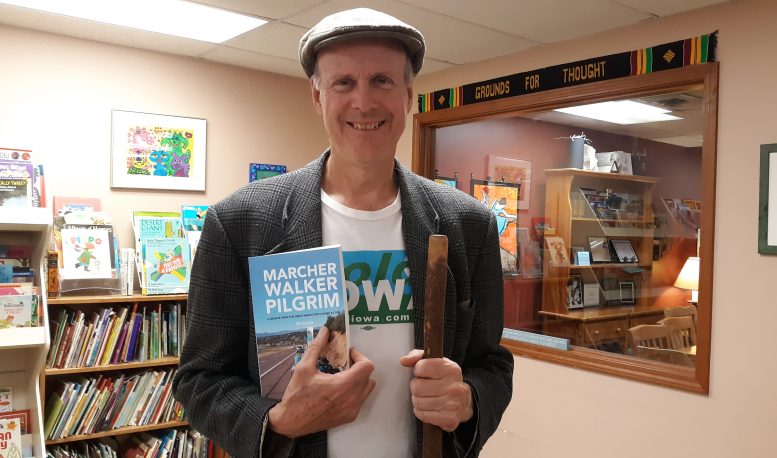By JAN LARSON McLAUGHLIN
BG Independent News
Ed Fallon equates the earth’s issues to home repairs. Humans are facing a dripping faucet, a creaking door and a loose shutter – all repairs that are not urgent.
Except for climate change.
“Climate change is the flaming wastebasket,” that humans need to respond to now, he said. “I don’t know how to sugar coat that. I’m not a scientist, but I can read and I can think.”
Humans have known about climate change for more than four decades. Much of industry and government buried the issue for years, and some now deny its existence.
Meanwhile, that flaming wastebasket is spreading.
“We don’t have a choice. We have to do this. Survival is at stake and that challenge is huge,” Fallon said.
Fallon, a former Iowa state congressman and director of Bold Iowa, took his own huge step in 2014 when he led the Great Climate March across the U.S.
For eight months, he and 50 other marchers walked from Los Angeles to Washington, D.C.
Earlier this month, Fallon stopped by Bowling Green to talk about climate change and his book detailing the march, called “Marcher, Walker, Pilgrim.”
“My hope is that as people read it, they are inspired to treat climate change as an emergency,” he said.
During the 3,000-mile march, Fallon lost 24 pounds, went through five pair of shoes, and grew an entire shoe size. The rubber tips on his walking stick would only last about 60 miles.
He craved meat along the march, and recalled seeing squirrels and cows along the route that looked mighty tasty.
And he talked about the frequent “marcher mush mind” experienced by the walkers in the long rural stretches. “You get a little goofy in the head.”
The marchers lived in tents and encountered many generous Americans along their trek – donating everything from fresh strawberries to new guitar strings to the walkers.
“Everywhere we went, we met people who were already dealing with climate change,” Fallon said. They passed through regions that had faced extreme winds, flooding, droughts and dust clouds.
“The people we met along the way were fascinating and had their own stories,” he said.

The only region that was not receptive to the marchers’ efforts was western Pennsylvania, where fracking had taken hold, Fallon said.
The march began in Los Angeles, which at that time had gone nearly 18 months with no rain. So of course, the first day of the march coincided with the first rainfall in the region. Fallon described walking that first 19.4 miles as 10 inches of rain fell.
“I thought we’ll never have a day that bad again,” he said.
But he was wrong.
As the march continued eastward, the walkers encountered 90 degree heat in Phoenix during the day, and 20 degrees and hail at night.
In Iowa, Fallon got the flu and continued walking 20 miles a day with a fever.
In Ohio, his Plantar Fasciitis flared up, making it incredibly painful to continue the daily treks. Just outside Toledo, one of the walkers using a baby stroller to carry her camping items, was struck by a car, but was able to continue.
After spending eight months with this “bold, loving and crazy” family of walkers, they made it to the nation’s capital and held a rally in front of the White House.
“What a gift it was to wander with the gypsies for a year,” Fallon said.
Though the current national political climate is worrisome, Fallon hasn’t given up hope.
“We have an apathetic political leadership,” and in some cases, a downright resistant leadership, he said. “But we have the ability to fix this.”
“I think we’re really close to the tipping point. This is not a political issue. This is a scientific issue,” he said. “Sometimes I get frustrated, but honestly it’s part of the work.”
America has worked together before on difficult causes.
“During WWII everybody sacrificed,” he said. “We have to target this crisis like we did back then.”
Nowadays, Fallon is working to get the attention of elected officials and candidates. He sees that time is running out, as Americans continue their complacency.
“This is not an issue. This is a crisis,” he said.
Fallon is especially trying to “bird dog the presidential candidates. We’re trying to make it really, really clear they have to address this.” So far, Washington Governor Jay Inslee is the only presidential candidate with climate change at the top of his agenda. The least accessible candidate for climate control advocates has been Bernie Sanders, he said.
“We’re going to continue to hammer and hammer away,” Fallon said. “What politicians value more than money, is votes.”
The nation needs a comprehensive approach to manage climate change. “We need policy changes in a big way.”
Asked for advice for citizens wanting to help, Fallon suggested they “be the change you want to see in the world.” He advised that people support local farmers and local businesses – and avoid big corporations.
“Most of the good stuff happening is at the local level,” he said.
Fallon suggested people bike and walk more to destinations, hang their laundry to dry, and recycle.
As for local efforts to ban single-use plastic bags, Fallon said that may help with pollution, but it won’t do much to limit climate change. “Don’t get distracted by plastic bags. The real culprit is fossil fuels,” he said.

